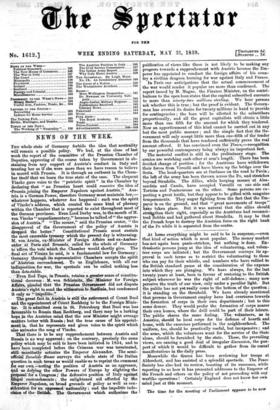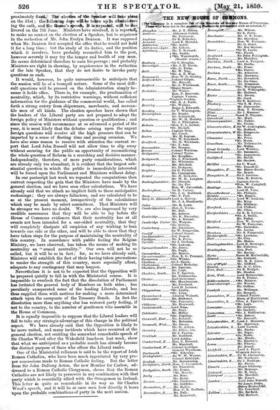The time for the meeting of Parliament appears to be
now proximately fixed. The election of the Speaker will take place on the 31st ; the 'ellewing days will be taken up in administer- ing the oath, and the Queen's speech, it is expected, wilt be livered on the 7th June. Ministers have resolved, it is reporte4 to make no contest on the election of a Speaker, but to acquiesce in the reelection of Mr. John Evelyn Denison. It was supposed when Mr. Denison first accepted the office that he would not hold it for a long time ; but the study of its duties, and the position which it involves, have probably reconciled him to the post, however severely it may try the temper and health of any man. He seems determined therefore to earn his peerage ; and probably Ministers are right in showing, by acquiescence in the reelection of the late Speaker, that they do not desire to invoke party questions as such.
It would, however, be quite unreasonable to anticipate that the session will be of a tranquil nature. Some of the most diffi- cult questions will be pressed on the Administration simply be- cause it holds office. There is, for example, the proclamation of neutrality, which, by its restrictive warnings, without sufficient
information for the guidance of the commercial world, has called
forth a strong outcry from shipowners, merchants, and mercan- tile men of all kinds. The election speeches have shown that the leaders of the Liberal party are not prepared to adopt the foreign policy of Ministers without question or qualification ; and since the session will recommence at so advanced a period of the year, it is most likely that the debates arising upon the urgent foreign questions will receive all the high pressure that can be imparted by a sense of fleeting time and passing occasion. We have also some reason to receive with attention the current re- port that Lord John Russell will not allow time to slip away without securing for the public an opportunity of reconsidering the whole question of Reform in a searching and decisive manner.
Independently, therefore, of mere party considerations, which are already only too abundant, it is evident that the largest sub- stantial question in which the public is immediately interested will be forced upon the Parliament and Ministers without delay. In our postscript last week we repeated the computations then current respecting the gain that the Ministers have made by the general election, and we have seen other calculations. We have already said that we attach no implicit faith to these anticipative reckonings ; they are always fallacious, and are calculated to be so at the present moment, irrespectively of the calculations which may be made by select committees. That Ministers will be stronger we have no doubt. We are also impressed by very credible assurances that they will be able to lay before the House of Commons evidences that their neutrality has at all events not been intended for a one-sided neutrality, that they will completely dissipate all suspicion of any wishing- to lean towards one side or the other, and will be able to show that they have taken steps for the purpose of maintaining the neutrality of this country. In accordance with public feeling the Belgian Ministry, we have observed, has taken the means of making its neutrality an " armed neutrality." Our own will not be so -sailed, but it will be so in fact ; for, as we have already said, Ministers will establish the fact of their having taken precautions to render the strength of this country, more especially afloat, adequate to any contingency that may happen.
Nevertheless it is not to be expected that the Opposition will be prepared quietly to fall in with the Ministerial course. It is impossible to overlook the fact that the dissolution of Parliament has irritated the general body of Members on both sides ; has peculiarly exasperated some of the leading Liberals, and has thus supplied them with motives for making a more determined attack upon the occupants of the Treasury Bench. In fact the dissolution more than anything else has restored party feeling, if not to the country, to the number of gentlemen who assemble in the House of Commons.
It is equally impossible to suppose that the Liberal leaders will fail to take any strategic advantage of this change in the political aspect. We have already said that the Opposition is likely to be more united, and many incidents which have occurred at the general election, not omitting the somewhat remarkable speech of Sir Charles Wood after the Wakefield luncheon last week, show that what we anticipated as a probable result has already become the distinct purpose of those who officer the Liberal ranks.
One of the Ministerial reliances is said to be the report of Irish Roman Catholics, who have been much ingratiated by very pro- per concessions made to Roman Catholic feeling. But the letter from Sir John Dalberg Acton, the new Member for Carlow, ad- dressed to a Roman Catholic Clergyman, shows that the Roman Catholics are not likely to persevere in any combination with that party which is essentially allied with the Orangemen in Ireland. This letter is quite as remarkable in its way as Sir Charles Wood's speech, and it will be at once seen how directly it bears upon the probable combinations of party in the next session.



























